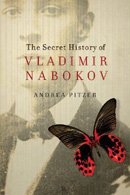The Daily Beast and The New Criterion on The Secret History
Long after I expected the well of reviews for The Secret History to have run dry, two new appraisals popped up.
Earlier this month, Jeffrey Meyers weighed in on the book for The New Criterion. In “Legacy of Sorrows,” Meyers—a biographer of Edmund Wilson and many other literary figures—declares that
The magician buried his past in his art and Pitzer has exhumed it. She reads the novels for their cryptic hints, oblique allusions and hidden political themes, their cunning fusion of history and art, and reveals new dimensions of meaning.
Meyers lists many of the high points of the book, pointing to my emphasis on a reading of Lolita that more directly reflects Nabokov’s savage century and suggesting that the phrase “secret history” in the title is apt. (The full but paywalled review is here.)
Most critics looking at The Secret History have focused on that Lolita material, which is hardly a surprise, given the novel’s place in our literary firmament. But another October review, posted on The Daily Beast, tackles Pale Fire and its historical context—what I would call the heart of the book.
In “Pale Fire and the Cold War: Redefining Vladimir Nabokov’s Masterpiece,” Michael Weiss bounces from a modern, delusional would-be Russian emperor to the novel’s backstory before writing that
Fifty years is long time to wait for a decryption device but one has been furnished by Andrea Pitzer, the author of the The Secret History of Vladimir Nabokov, not just one of the most beguiling literary biographies to come out in years but also a first-rate addition to the groaning shelf of Nabokov studies.
Weiss goes on to trace the ways in which Nabokov’s most experimental novel echoes Soviet atrocities and the political hijinks of Nabokov’s lifetime—particularly the Cold War era of the book’s composition. Adding his own tidbits from rereading the novel, Weiss seconds the book’s thesis that Nabokov folded the Gulag-centered legends of the real-world Nova Zembla into Pale Fire‘s fantasy kingdom, which has big implications for… well, read the review—or the book—for yourself.
